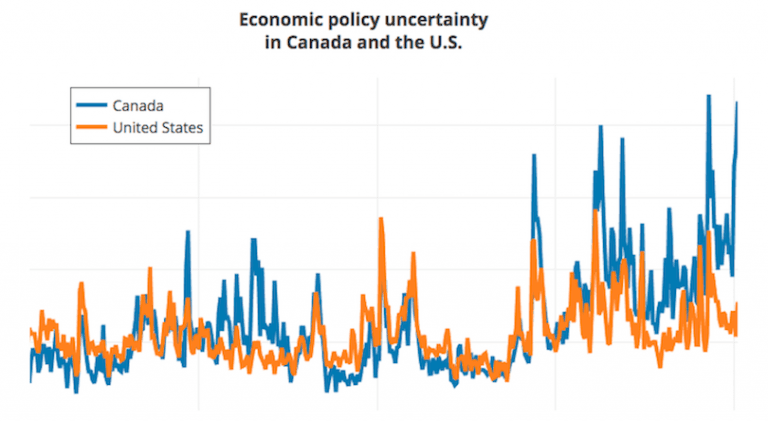This global index shows uncertainty about Canada’s economy is spiking
A U.S.-based policy uncertainty index shows that for all of Donald Trump’s unpredictability, it’s Canadians who are scratching their heads about the future

Share
If there’s one word that defines the Canadian economy at the moment, it’s uncertainty—what with the shaky housing market, towering household debt loads and, of course, a certain orange-hued world leader rattling the sabre of trade wars. But new data released by a group of U.S.-based economists suggests that for all of Donald Trump’s day-to-day unpredictability in the U.S., economic uncertainty in Canada is far more extreme.
The Economic Policy Uncertainty Index, developed by academic economists at three major U.S. universities, tracks media coverage of policy-related uncertainty in a variety of advanced economies over time. Their work shows that Trump’s election led to a spike in Americans scratching their heads about what to expect next for the economy, but that Canadians at the time were even less sure of the policy landscape. (Prior to that, uncertainty in Canada most dramatically outpaced the U.S. when oil prices collapsed in 2008 and 2015, and in the 1990s during Canada’s debt crisis.) Yet while uncertainty over the U.S. economy has settled down in the last year, in Canada it’s back near its all-time highs.
A long list of factors drive that uncertainty. Not a day passes without a new story about hard bargaining at NAFTA renegotiations, which forces businesses to reconsider their investments and put off decisions until they know more about the future of cross-border trade. Canada’s energy industry is skeptical that major new pipelines can be built in Canada unless the feds make it easier to win approval, and that gives oil producers headaches about planning for future production. Governments across the country are amassing huge deficits with no clear path back to balance. Then there’s Stephen Poloz, the Bank of Canada governor who has a precarious decision to make: keep pace with rising U.S. interest rates and risk growth—not to mention driving up interest costs for heavily indebted households—or stand pat and risk a collapsing loonie.
As America appears to adjust to life under Donald Trump, in Canada confusion and anxiety over the economy remains high.